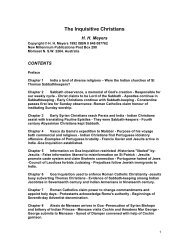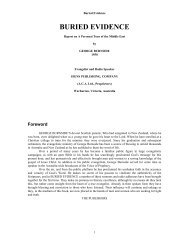Battle of the Bibles - Present Truth
Battle of the Bibles - Present Truth
Battle of the Bibles - Present Truth
Create successful ePaper yourself
Turn your PDF publications into a flip-book with our unique Google optimized e-Paper software.
Chapter Two<br />
Colet and Erasmus<br />
Desiderius Erasmus <strong>of</strong> Holland was twelve years Reuchlin's junior. He was born<br />
in 1467 <strong>of</strong> parents who had neglected <strong>the</strong> formality <strong>of</strong> wedlock; yet this did not deter<br />
<strong>the</strong>m from naming <strong>the</strong>ir son, "Gerard", meaning in Dutch, "The Beloved".<br />
The young Gerard early showed all <strong>the</strong> classic signs <strong>of</strong> genius. His fascination<br />
and aptitude for learning languages were soon put to practical use. He sought out <strong>the</strong><br />
Greek equivalent <strong>of</strong> his name and promptly renamed himself "Erasmus". To this he<br />
prefixed <strong>the</strong> Latin equivalent "Desiderius"; hence a name was coined which would within<br />
his lifetime, attract to itself a lustre rarely duplicated in any one generation. Acclaimed as<br />
"<strong>the</strong> great genius <strong>of</strong> <strong>the</strong> age", he was destined to do for <strong>the</strong> New Testament what<br />
Reuchlin had done for <strong>the</strong> Old.<br />
Although unlike his younger contemporary, Martin Lu<strong>the</strong>r who was born in 1483,<br />
it would not be to <strong>the</strong> credit <strong>of</strong> <strong>the</strong> Reformers to designate Erasmus as such. Yet his life<br />
and work were indispensable to <strong>the</strong> development <strong>of</strong> <strong>the</strong> Reformation.<br />
As was <strong>the</strong> custom <strong>of</strong> his time, Erasmus received a monastic education, but this<br />
experience only served to alert him to <strong>the</strong> folly <strong>of</strong> <strong>the</strong> prevailing scholasticism and <strong>the</strong><br />
malpractices <strong>of</strong> <strong>the</strong> church. He was to spend much <strong>of</strong> his early career sharpening his wit<br />
and literary skills in satirising <strong>the</strong> vices practised by <strong>the</strong> clerics.<br />
In so doing, he was only confirming <strong>the</strong> developing antisacerdotal tendency <strong>of</strong><br />
<strong>the</strong> age, a condition which <strong>the</strong> church blamed upon <strong>the</strong> revival <strong>of</strong> learning brought about<br />
by classical scholars whom it was pleased to brand as "humanists". In many cases this<br />
was true, especially as we have noted <strong>of</strong> <strong>the</strong> Italian scholars.<br />
But in England and Germany <strong>the</strong> scholarship <strong>of</strong> <strong>the</strong> <strong>the</strong>ologians had been<br />
tempered by <strong>the</strong> now widespread teachings <strong>of</strong> Wycliffe and his followers, a circumstance<br />
not readily available to <strong>the</strong> Italians by virtue <strong>of</strong> <strong>the</strong>ir proximity to Rome. Then <strong>the</strong>re was<br />
an almost constant stream <strong>of</strong> rottenness issuing forth from <strong>the</strong> Holy See, <strong>the</strong> effects <strong>of</strong><br />
which conditioned <strong>the</strong> minds <strong>of</strong> thinking Italians to embrace a humanistic philosophy.<br />
Perhaps it was <strong>the</strong> divine hand <strong>of</strong> Providence that prevented Erasmus's monastic<br />
training from confirming him in such a course through his meeting with John Colet.<br />
John Colet, son <strong>of</strong> a London Lord Mayor, was naturally <strong>of</strong> a religious<br />
temperament. Having spent some time as a student at Oxford, he went to Rome to<br />
fur<strong>the</strong>r his ecclesiastical education. There he was imbued with <strong>the</strong> spirit <strong>of</strong> <strong>the</strong> revival <strong>of</strong><br />
learning. But <strong>the</strong> scandalous stories he <strong>the</strong>re heard about <strong>the</strong> comparatively recent<br />
behaviour <strong>of</strong> Pope Alexander VI and Caesar Borgia, impressed him with <strong>the</strong> urgent need<br />
for ecclesiastical reform.<br />
Returning to Oxford, Colet lectured on <strong>the</strong> works <strong>of</strong> <strong>the</strong> church and its system <strong>of</strong><br />
religion, condemning its preoccupation with power, money and pleasure, and<br />
denouncing <strong>the</strong> loose morals <strong>of</strong> <strong>the</strong> clergy. As for <strong>the</strong> popes, he spoke <strong>of</strong> <strong>the</strong>m as<br />
"wickedly distilling poison to <strong>the</strong> destruction <strong>of</strong> <strong>the</strong> Church" (Seebohm, "The Era <strong>of</strong> <strong>the</strong><br />
Protestant Revolution", p 77).<br />
In evidence <strong>of</strong> his sincerity as an honest Catholic committed to reforming his<br />
church, Colet cried:<br />
"Oh Jesu Christ, wash for us not our feet only, but also our hands and our head!<br />
O<strong>the</strong>rwise our disordered Church cannot be far from death". (ibid p 78)<br />
7





